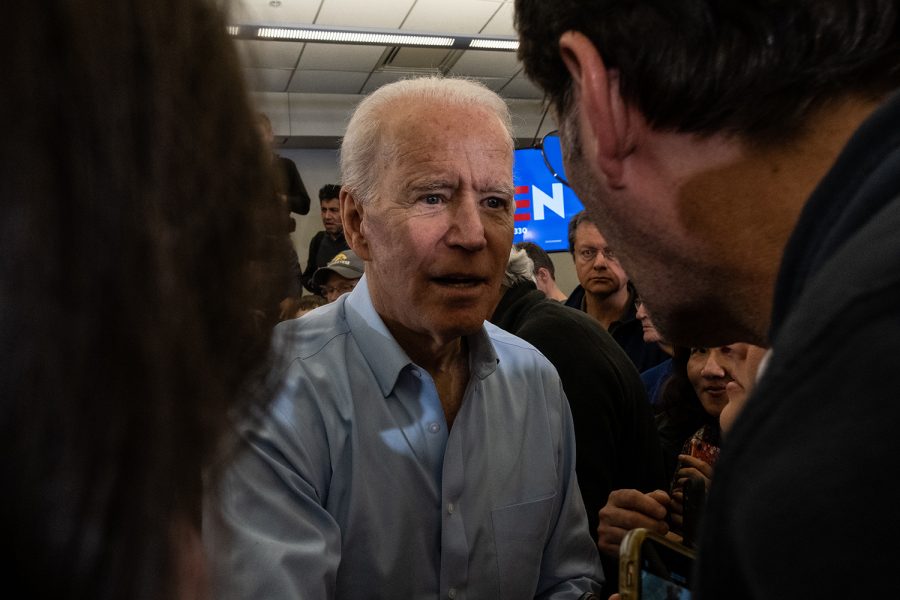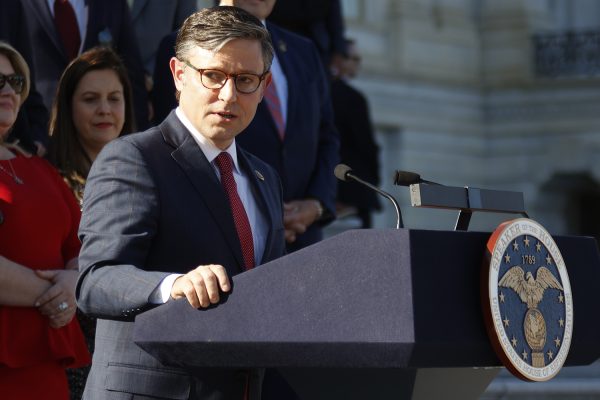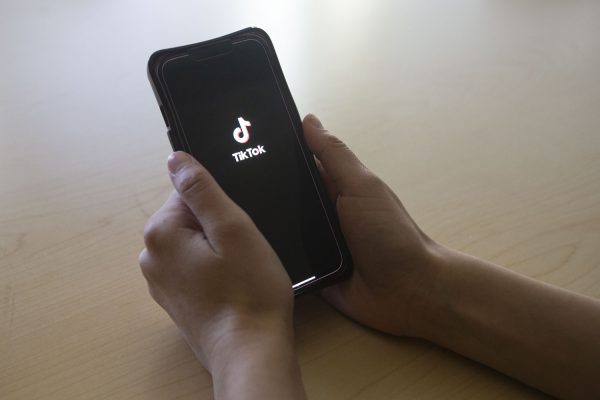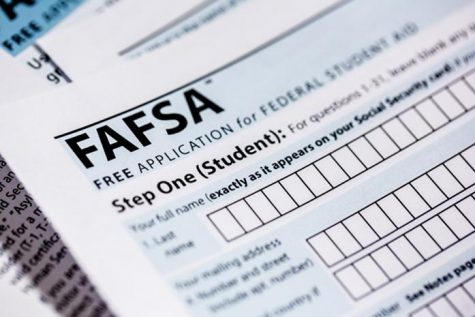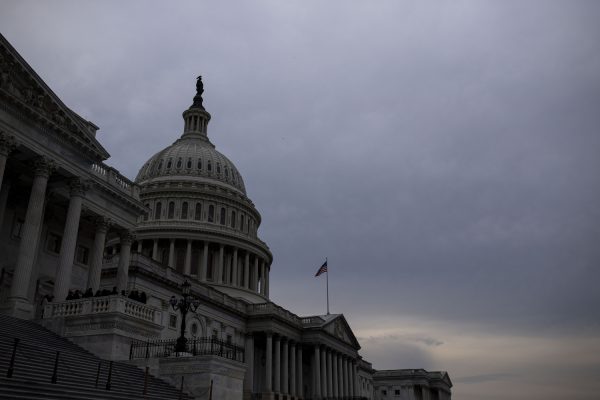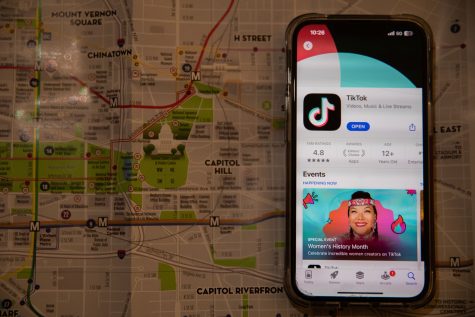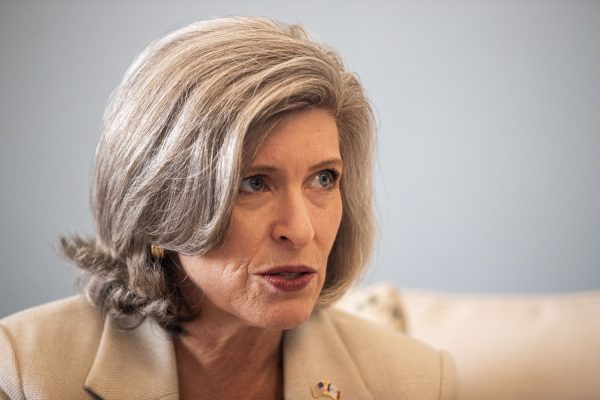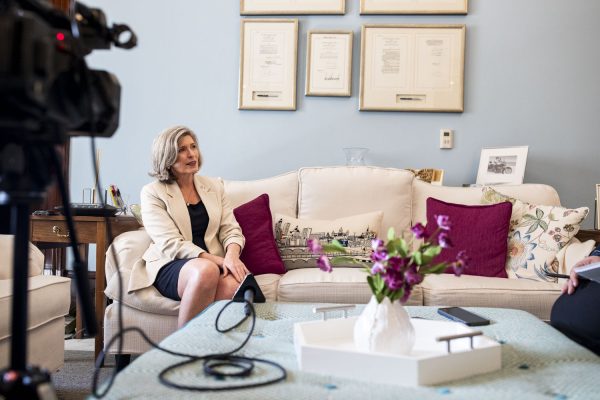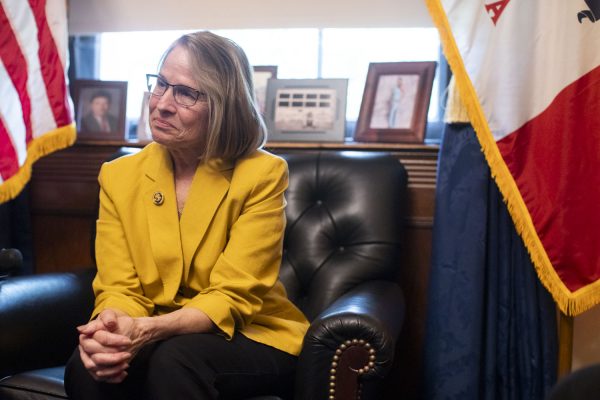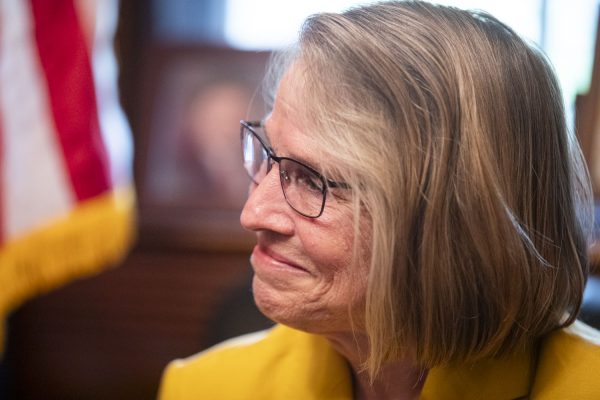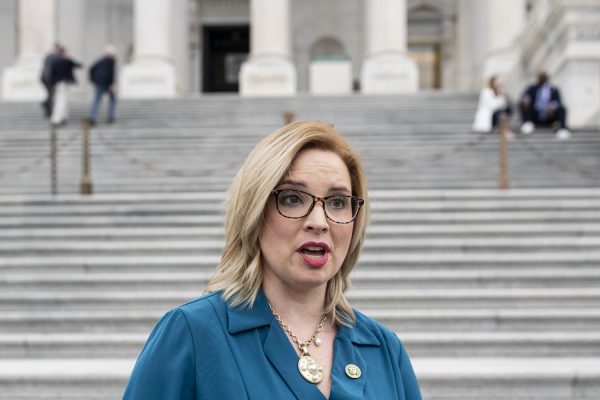Progressives in Iowa are disappointed by Biden’s nomination – but most still plan to vote for him
Joe Biden left the Iowa caucuses with only 15 percent of the state’s delegate equivalents. Two months later he became the presumptive Democratic presidential nominee — and some Iowans are disappointed.
Former Vice President Joe Biden speaks with audience members following a campaign event in North Liberty on Saturday, February 1, 2020. With the Iowa Caucuses happening in two days, former Vice President Biden stopped to give a last minute pitch to Iowa voters. (Wyatt Dlouhy/The Daily Iowan)
May 5, 2020
Iowans who caucused in February for younger or more progressive candidates are grappling with the reality of Joe Biden’s status as the Democratic nominee, but a handful The Daily Iowan spoke with said they plan to vote for him.
The DI spoke with voters and former caucusgoers from a variety of age ranges, and the DI met these Iowans at campaign events across the state before the Feb. 3 caucuses.
University of Iowa third-year student John Lyons, from New Berlin, Wisconsin, said Biden does not represent his more progressive values, but that to him, the reelection of President Trump would be disastrous.
Lyons followed the Democratic primary closely and caucused for Sen. Bernie Sanders, I-Vt. He said he was drawn to caucus for the Vermont senator because of the progressive movement Sanders was able to build, and thought he had the ability to create changes on issues such as health care and criminal-justice reform.
“I plan to vote for Joe Biden, but I would never say that someone else has to,” Lyons said. “It is the Biden campaign’s responsibility to earn the voters that don’t believe he represents them, and it’s up to those voters to make the call for themselves.”
Sanders was the one-time national front runner of the race and received the most support in the raw body count during the caucuses.
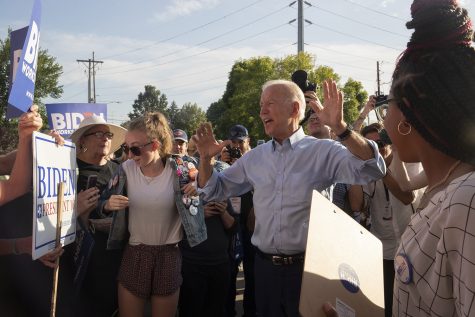
Former Vice President and 2020 democratic candidate Joe Biden speaks to attendees outside after his speech at the opening of his campaign office on S. Gilbert St. on Wednesday, August 7, 2019.
Biden became the presumptive nominee nearly two months after the Iowa presidential precinct caucuses, emerging as the winner of a historically large and diverse Democratic primary field. At its peak, the party’s nomination race had 25 candidates, all of whom spent the better part of 2019 campaigning in Iowa.
The former vice president took fourth place in the caucuses with 15.8 percent of the state delegate equivalents. Despite a fifth-place finish in New Hampshire and second-place in Nevada, Biden’s campaign gained momentum following a first-place finish in South Carolina.
A major reservation with Biden’s candidacy, four voters interviewed by the DI said, was the sexual-assault allegations made against him by former Senate aide Tara Reade, who alleged Biden assaulted her in 1993. Biden has denied the allegations.
Trump has been accused of sexual misconduct by at least 17 women.
Lyons said the allegations facing both presidential candidates are difficult to come to terms with when making a choice as to whom to vote for.
“It is a really heartbreaking fact no matter who is the president come November, we are in a situation where both candidates have been accused of sexual assault,” Lyons said.
Although some young voters interviewed expressed reservations in voting for Biden, polling shows Biden does not have a serious disadvantage among young people.
A March 4-17 poll from CNN of 1,211 respondents with a 3.3 percent margin of error shows only 8 percent of Democrats plan not to vote for Biden.
Jordan Miller, a fourth-year student from Sumner, Iowa, who led the Students for Biden organization on the UI campus, said he understands why some may be disappointed in Biden’s nomination.
“I know he is working very hard to persuade these voters, these younger people, to his campaign,” Miller said. “However, that’s how democracy works — whoever gets the most votes in a primary or general election, that’s who becomes the nominee. I understand people are disappointed — I know if the vice president had not gotten the nomination, I would have been disappointed, too.”
RELATED: Iowa City supporters hopeful for progressive movement after Bernie Sanders exits race
Sue Dvorsky, of Coralville, the Iowa Democratic Party chair during the 2008 caucuses, said that while a small group of people will not vote for Biden, the current situation differs from 2016, the first time Sanders lost the nomination.
Fifty percent of the 18-29 year-old electorate turned out in 2016, according to the Brookings Institute, similar to 49 percent in 2012.
Dvorsky, who had endorsed Sen. Kamala Harris of California, and later Sen. Elizabeth Warren of Massachusetts, said she views Biden as a transitional figure, and that he is the right nominee to unseat Trump and potentially set the country up for an eventual female president.
“This does not feel to me like 2016 felt — it simply doesn’t,” Dvorsky said. “That conversation is not progressing. Are there a handful of people who are so disgruntled after a primary that they won’t vote for the eventual nominee on both sides? Sure.”
Dvorsky said she is speaking to moderate or conservative voters who might consider Biden instead of talking to disappointed Sanders supporters who don’t plan to vote on Election Day.
“I’m happy to talk to anybody,” she said, “but if anyone says to me, ‘It’s not Sanders so I’m not voting,’ then I have to go talk to someone who will.”
Some progressive voters felt less optimistic about Biden’s chances of beating Trump.
Des Moines resident Bradford Fleener, 36, originally caucused for entrepreneur Andrew Yang but then chose Sanders when Yang wasn’t viable.
“I don’t feel Biden has any chance of beating Trump,” said Fleener, whom the DI also spoke with at the Iowa State Fair in August. “He didn’t have good chances at the beginning of his campaign, and his chances have done nothing but diminish. For everything that Biden can argue against Trump on — Trump can throw it back at him. They have a very similar history.”
An April 30 poll from Public Policy Polling shows Trump at 48 percent in Iowa to Biden’s 46 percent. Several nation-wide polls show Biden ahead of Trump by several points. An April 26-28 Emerson College poll shows Biden ahead of Trump by 7 points nationally.
UI sophomore Kyle Kopf, who volunteered for the Yang campaign and caucused for him in February, said he was disappointed with the way the race played out, especially with candidates of color having to drop out of the race.
“I’m disappointed with the result but I’m going to vote for Biden because I think he’s better than Trump,” Kopf said. “I think we had lots of great diversity and lots of people excited by that diversity, and I think we could have had a better nominee.”
Kopf started volunteering for Yang in 2018. He said he was drawn to Yang’s message about ending poverty and providing a Universal Basic Income, along with Yang’s status as a political outsider.
Grimes, Iowa resident Jiaming Yin, 53, who the DI first spoke to at the Iowa State Fair in August, caucused for Warren. He said he plans to vote for Biden, but would have preferred a younger candidate who has not been involved in politics for as long as Biden, 77, who served for 36 years as senator of Delaware.
“I would prefer he picks someone much younger (as his running mate). Gender is not really an issue for me,” Yin said. “I’d like to have him pick somebody who has much more charisma and much better oratory skills.”
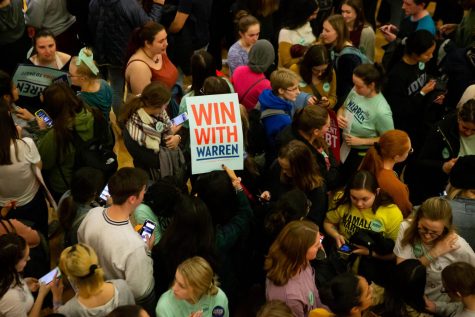
A sign for Sen. Elizabeth Warren, D-Mass. is seen during a caucus at the Iowa Memorial Union on Feb. 3.
Several people interviewed at campaign events over the course of Democratic candidates’ visits mentioned the need for climate-change regulation as an area where Biden could be more aggressive and appeal more to progressives. Biden’s climate plans include reaching net-zero carbon emissions by 2050. Biden does not support the Green New Deal, seen as a litmus test for progressive action toward reversing climate change.
UI first-year student Nolan Hanson did not wish to disclose if he will vote for Biden in November.
Hanson noted that Biden’s F rating on climate change from environmental group The Sunrise Movement, a progressive group which advocates for a Green New Deal, as something for the candidate to improve. The group endorsed Sanders’ candidacy and Hanson, who caucused for Sanders, will be a delegate for Sanders at the district convention.
Though Sanders supporters interviewed expressed disappointment in Biden’s nomination, Dvorsky said she met voters in 2016 who had considered not voting for former Secretary of State Hillary Clinton, but said she has not met any Sanders supporters this year who will not vote for Biden.
“In real life, that’s not happening anymore,” Dvorsky said of the perception that many may not vote for Biden. “I think that is a phenomenon of a very small group on social media.”



